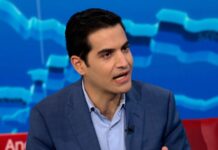
President Donald Trump is pushing back hard against accusations from former Fox News host Tucker Carlson, who accused him of betraying the “America First” doctrine by aligning too closely with Israel’s recent preemptive strikes on Iranian nuclear sites.
The dispute erupted after Carlson’s latest newsletter, ominously titled “This Could Be the Final Newsletter Before All-Out War,” criticized Trump for what he called complicity in an act of war against Iran—arguing that continued U.S. support for Israel’s military actions could drag America into a regional conflict.
“Politicians purporting to be ‘America First’ can’t now credibly turn around and say they had nothing to do with it,” Carlson wrote, adding that Trump “bragged” about years of arms transfers to Israel and helped enable the strikes.
In a sharp rebuttal during an interview with The Atlantic, Trump dismissed Carlson’s framing and reaffirmed his exclusive claim over the “America First” mantle:
“Well, considering that I’m the one that developed ‘America First’ and considering that the term wasn’t used until I came along, I think I’m the one that decides that.”
Trump argued that defending U.S. interests means preventing Iran from acquiring a nuclear weapon—even if that means supporting Israeli military action.
“For those people who say they want peace—you can’t have peace if Iran has a nuclear weapon,” Trump said. “That’s not peace. That’s capitulation.”
Trump clarified that he had originally opposed an Israeli offensive, concerned it would derail ongoing nuclear negotiations with Iran. According to the New York Post, Trump told reporters before the strikes: “I don’t want them going in because I think it would blow” the talks. But once the strikes happened—reportedly eliminating key Iranian nuclear scientists and military leaders—Trump shifted tone, emphasizing that Iran had ignored his 60-day ultimatum to strike a new nuclear deal.
Secretary of State Marco Rubio echoed a distancing strategy, stating clearly:
“We are not involved in strikes against Iran.”
Still, Carlson wasn’t convinced, pointing to past U.S. arms deals with Israel and alleging that Washington “knew these attacks would happen.”
Trump countered this narrative by revealing that he had previously vetoed an Israeli plan to assassinate Iran’s Supreme Leader, warning allies such a move could spark a broader war. That decision, he claims, shows his restraint and strategic intent—not warmongering.








